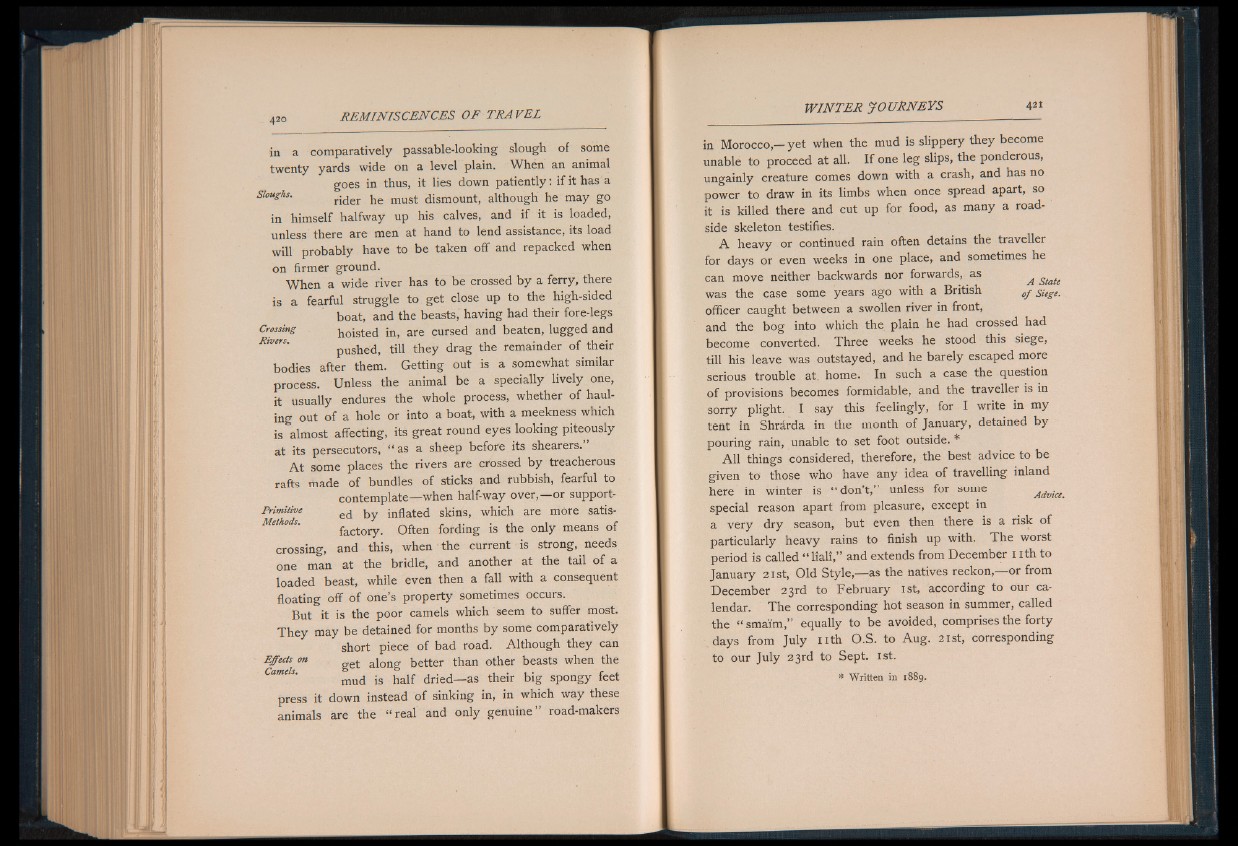
in a comparatively passable-looking slough of some
twenty yards wide on a level plain. When an animal
goes in thus, it lies down patiently: if it has a
Sloughs. rider he must djsmountj although he may go
in himself halfway up his calves, and if it is loaded,
unless there are men at hand to lend assistance, its load
will probably have to be taken off and repacked when
on firmer ground.
When a wide river has to be crossed by a ferry, there
is a fearful struggle to get close up to the high-sided
boat, and the beasts, having had their fore-legs
Crossing hoisted in, are cursed and beaten, lugged and
pushed, till they drag the remainder of their
bodies after them. Getting out is a somewhat similar
process. Unless the animal be a specially lively one,
it usually endures the whole process, whether of hauling
out of a hole or into a boat, with a meekness which
is almost affecting, its great round eyes looking piteously
at its persecutors, “ as a sheep before its shearers.
A t some places the rivers are crossed by treacherous
rafts made of bundles of sticks and rubbish, fearful to
contemplate— when half-way over, or support-
Primitive ed by inflated skins, which are more satisfactory.
Often fording is the only means of
crossing, and this, when the current is strong, needs
one man at the bridle, and another at the tail of a
loaded beast, while even then a fall with a consequent
floating off of one’s property sometimes occurs.
But it is the poor camels which seem to suffer most.
They may be detained for months by some comparatively
short piece of bad road. Although they can
Effects cm t aiong better than other beasts when the
mud is half dried— as their big spongy feet
press it down instead of sinking in, in which way these
animals are the “ real and only genuine” road-makers
WINTER JOURNEYS 421
in Morocco,— yet when the mud is slippery they become
unable to proceed at all. If one leg slips, the ponderous,
ungainly creature comes down with a crash, and has no
power to draw in its limbs when once spread apart, so
it is killed there and cut up for food, as many a roadside
skeleton testifies.
A heavy or continued rain often detains the traveller
for days or even weeks in one place, and sometimes he
can move neither backwards nor forwards, as ^
was the case some years ago with a British siege.
officer caught between a swollen river in front,
and the bog into which the plain he had crossed had
become converted. Three weeks he stood this siege,
till his leave was outstayed, and he barely escaped more
serious trouble at. home. In such a case the question
o f provisions becomes formidable, and the traveller is in
sorry plight. I say this feelingly, for I write in my
tent in Shrarda in the month of January, detained by
pouring rain, unable to set foot outside. *
All things considered, therefore, the best advice to be
given to those who have any idea of travelling inland
here in winter is “ don’t,” unless for some Advice.
special reason apart from pleasure, except in
a very dry season, but even then there is a risk of
particularly heavy rains to finish up with. The worst
period is called “ liali,” and extends from December 1 ith to
January 21st, Old Style,— as the natives reckon, or from
December 23rd to February 1st, according to our calendar.
The corresponding hot season in summer, called
the “ smai'm,” equally to be avoided, comprises the forty
days from July n th O.S. to Aug. 21st, corresponding
to our July 23rd to Sept. 1st.